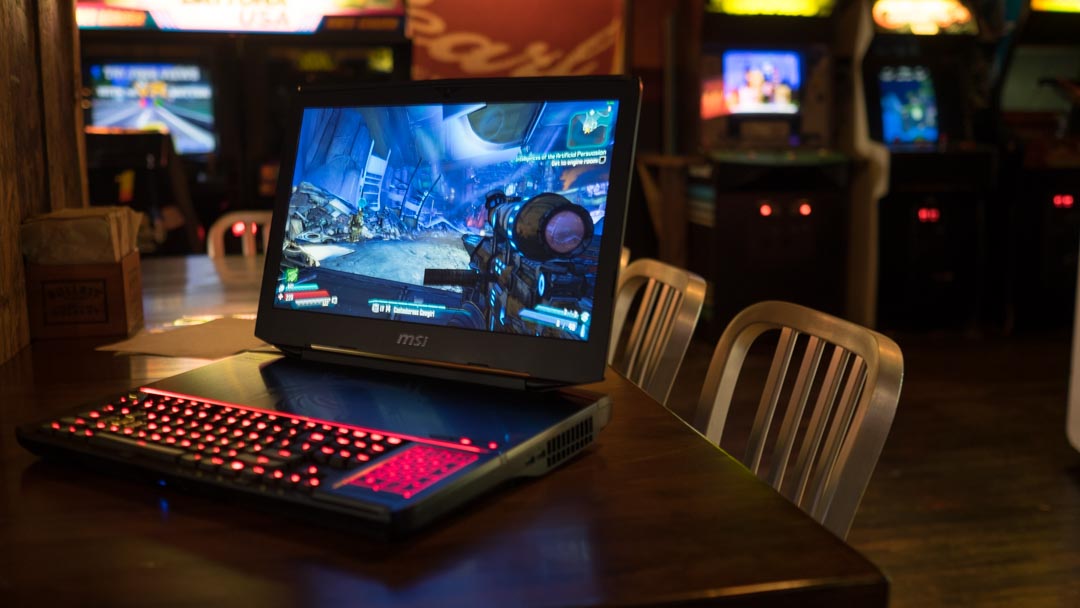Why you can trust TechRadar
Unsurprisingly, the MSI GT80 Titan is one of the best performing machines I've ever tested. With a pair of Nvidia GTX 980M firing on all cylinders, this machine easily churned through every punishing game I threw at it, including Dragon Age Inquisition with all the graphical settings pumped up to their highest.
GTA 5, Borderlands: The Pre-Sequel, Metal Gear: Ground Zeroes and pretty much anything I threw the Titan's way ran smoothly. The only speed bump I ran into was the recently-released Project Cars. Practice races went without a hitch at an amazing 90 to 110 frames per second (fps), despite turning on every minute detail like "heat haze" and "screen dirt." In the campaign though, it seems the addition of AI drivers adds a significant amount of stress to performance, causing the frame rate in Project Cars to drop precipitously down all the way to 11.
Despite this small hiccup, the MSI GT80 Titan is, without a doubt, one of the most powerful gaming laptops ever made.
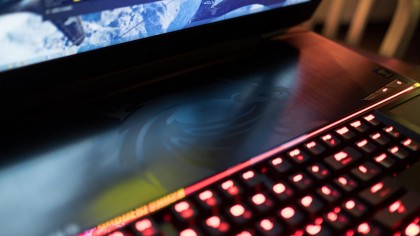
Here's how the MSI GT80 Titan fared in our benchmark tests:
Benchmarks
- 3DMark: Cloud Gate: 22,854; Sky Diver: 27,220; Fire Strike: 11,770
- Cinebench CPU: 653 points; Graphics: 104 fps
- PCMark 8 (Home Test): 4,034 points
- PCMark 8 Battery Life: 1 hours and 55 minutes
- Middle Earth: Shadow of Mordor (1080p, Ultra): 109 fps; (1080p, Low): 135 fps
- Metro: Last Light (1080p, Ultra): 57 fps; (1080p, Low): 119 fps
Benchmarking the Titan proves just how impressive this mobile gaming rig is, with a Fire Strike score of 11,770 points. By comparison, the Aorus X7 Pro scored a still impressive 10,451 points, with its dual Nvidia GTX 970M graphics cards. Meanwhile, the Alienware 17 scraped by with 9,591 points, thanks to its desktop graphics card. Without the added boost from the Nvidia GTX 980, The Alienware 17 finished the grueling graphics benchmark with a much more pedestrian 8,008 points.
Metro: Last Light's in-game benchmarks is what truly separates the wheat from the chaff, and the MSI GT80 stands above all the computers I've ever tested, with an astounding 57 fps on Ultra. No other machine come close running the game at a steady 60 fps. The Aorus X7 Pro topped out at 43 fps and the Alienware 17 came short as well with just 45 fps.
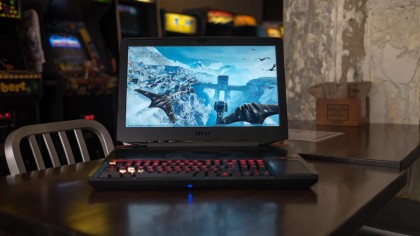
Cinema experience
Thankfully, the MSI GT80 does not fall prey the usual terrible screen trap that has ruined the experience of so many gaming laptops. You won't find any washed out colors or terribly grey contrast here.
Sign up for breaking news, reviews, opinion, top tech deals, and more.
The Titan instead is fitted with one of the richest and most expansive matte displays I've ever seen. While some would argue 1080p isn't high-resolution enough for the large 18.4-inch screen, the panel is still plenty sharp, and the pixels are still small enough that they look invisible to the human eye from a normal distance.
The Dynaudio's audio integration, on the other hand, sound significantly less impressive despite the laptop's pair of powerful speakers and bottom-mounted subwoofer. Music in particular reveals the tininess of the Titan's onboard tweeters, and turning up the volume up to 20 in Windows 8.1 begins revealing some ear-pinching distortion. Thankfully though, the speakers are much better suited to the booming sounds of fiery spells and gunfire in games.
More than likely, you'll want to use a gaming headset with such a serious setup as the Titan. This machine is certainly not lacking in the number of ways you can hook up an audio setup, either, with individual input and output jacks, as well as an optical audio port.
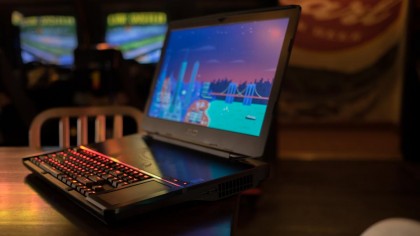
Is there even a battery in here?
Battery life is virtually non-existent on the MSI GT80, lasting a scant 1 hour and 55 minutes, according to the PCMark 8 battery test. Even with a low-impact anecdotal test consisting of word processing in Microsoft Word 2013, some light web browsing in Firefox and streaming Google music with the OutColdPlayer, the Titan only lasted a slightly longer 2 hours and 8 minutes. Given the sheer size of the laptop, I was expecting MSI to fit this machine with a larger battery.
It's unlikely you'll be using this machine away from a power outlet – or on your lap, for that matter – for long. But if you're in a pinch and need to squeeze just a few more minutes of juice, MSI's power management utility include additional power saving modes, plus there's the physical button to switch the machine to integrated graphics.
Aorus X7 Pro ran for an equally short 2 hours and 5 minutes, no doubt thanks to its power hungry dual-GPU setup and integrated Iris graphics. Users looking for a gaming laptop with more outlet independence should look to the Alienware 17, which kept chugging along for 3 hours and 52 minutes.
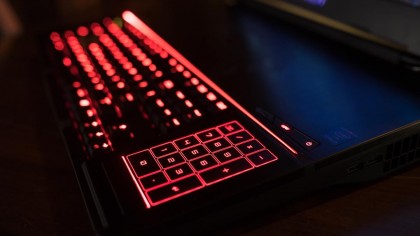
Bundled software
For a gaming machine, and such an expensive one at that, MSI has included a surprising amount of bloatware. Just a few bits of unwanted, pre-installed software you should get rid of from the moment you get past start up include W Games, Fresh Paint, and Norton Internet Security. That said, the Titan is not just loaded with junk. Here are a few applications you will want to keep on your desktop:
- Battery calibration – As the name suggests, this tool will condition your battery to keep it healthy.
- MSI Sizing Option – Like Windows' built-in scaling setting, this application will affect how small or large everything looks on the screen.
- MSI Dragon Gaming Center – Monitor your system and manage a few system preferences, such as performance modes.

Kevin Lee was a former computing reporter at TechRadar. Kevin is now the SEO Updates Editor at IGN based in New York. He handles all of the best of tech buying guides while also dipping his hand in the entertainment and games evergreen content. Kevin has over eight years of experience in the tech and games publications with previous bylines at Polygon, PC World, and more. Outside of work, Kevin is major movie buff of cult and bad films. He also regularly plays flight & space sim and racing games. IRL he's a fan of archery, axe throwing, and board games.
